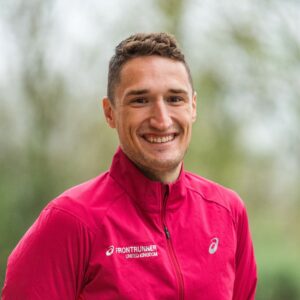My name is Robert Mann and I am currently a Postdoctoral Research Associate based at the Children’s Health and Exercise Research Centre, University of Exeter. My “academic journey” began by completing a BA (Hons) degree in Sport and Social Science at the University of Bath. This was followed by an MRes and PhD in Health and Wellbeing, completed at the University of Exeter, both funded by the Economic and Social Research Council (ESRC).

My time is currently split across two research projects. The first is a natural extension of my PhD research, working to better understand (and address) the injury and illness problem in adolescent distance runners, alongside supporting England Athletics’ Youth Talent Pathway – adopting a ‘researcher-in-residence’ approach. This work is funded by the ESRC and in partnership with England Athletics. The second project involves planning and delivering a feasibility trial related to a novel digital physical activity intervention for young people with Cystic Fibrosis. This work is funded by the National Institute for Health Research and is being led by Dr Samantha van Beurden.
Outside of work, I am a bit of an endurance junkie. Having focussed on distance running for a number of years, I am slowly starting to branch out into triathlon. I am really fortunate to be part of the UK ASICS FrontRunner team, so enjoy putting all of their new kit to the test!
What is your main area of research / clinical expertise?
With my undergraduate having been in the social sciences, followed by an MRes and PhD that adopted a multidisciplinary approach (including plenty of ‘ology’ – physiology, psychology, and epidemiology), I have enjoyed exploring a broad range of research areas. That said, this research has largely been focused on exploring the extent of the injury and illness problem in adolescent distance runners. I guess that this can best be described as research related to “athlete health protection.” I am also really interested by how physical activity, exercise, and sport can be applied to support the health and wellbeing of children and adolescents.
What is your motivation to be a member of the BOSEM team?
BOSEM have developed a really strong Editorial Board, alongside trying to better accommodate qualitative research within a quantitatively-driven research field. As an Early Career Researcher, my motivation is to learn as much as possible from BOSEM colleagues, while being able support authors throughout the peer-review process and advocate the value of academic work that doesn’t neatly fit into square holes.
What is a work-related accomplishment that you’re really proud of?
As something a bit more personal, I have a speech impediment (stammer). This can be quite a challenge within academia, whereby verbal fluency is often expected – I don’t think I have seen a job advert that hasn’t required “good written and verbal communication skills” as part of the specification! As a result, I am really proud of having been able to publish a book chapter related to my own lived experiences of stammering and academia. Successfully defending my PhD thesis (orally) was something that I take great pride in too! I intend to support BOSEM further develop a research community that advocates equality, diversity, and inclusion within the field of Sport and Exercise Medicine (and beyond!).
Who has influenced you most when it comes to how you approach your work?
I have been fortunate to cross paths with many inspiring academics and practitioners throughout my PhD and current projects. That said, my primary PhD supervisor, Prof. Alan Barker, has had the greatest influence on my approach to my work. I have learnt to appreciate how he is able to develop a sustainable work ethic, maintain a passion for novel scientific thinking, and find time for anyone wants to delve deeper into a research topic.
What’s your favourite way to unwind after a busy day?
A sustained bout of exercise followed by a period of sedentary time!